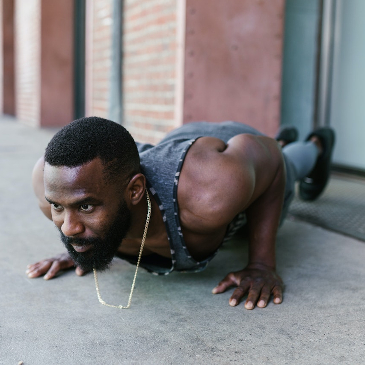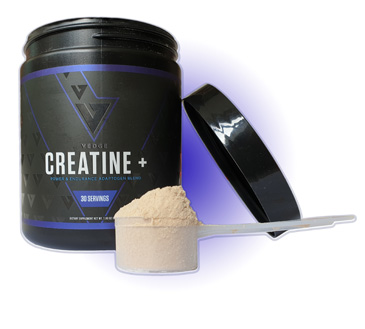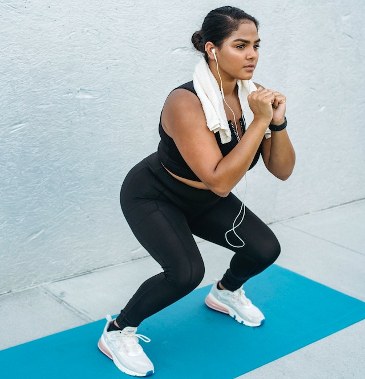Calisthenics is strength training primarily using bodyweight as the resistance. But then I’d hazard a guess you knew that already 🙂 So let’s not get into the intricacies of this popular exercise technique and answer the question you came here for: “Can you take creatine while doing calisthenics?”
You may also like: What is the best vegan creatine supplement on the market?
Can You Take Creatine While Doing Calisthenics?
Yes, you can take creatine while doing calisthenics and in fact you’re likely to notice a significant improvement in performance because the biological action of creatine is particularly well suited to the demands placed on the body during and after a calisthenics workout.
Watch: Matt Schifferle on why creatine works well with calisthenics
(Matt gets right to the point, no fluff & nonsense!)
Creatine Usually Improves Your Calisthenics Performance
Not everyone responds to creatine.

Those that do often report much faster recovery times after an intense workout. If you don’t feel any different supplementing with creatine then you’re what is known as a non-responder.
Non-responders are reportedly around 20% of those who try creatine and the only way to find out if you’re going to benefit from this widely used supplement is to try it.
It’s not really known why a fifth or so of people don’t respond … some proponents claim they’re simply not taking it properly and others cite the fact that creatine levels may already be elevated due to high red meat consumption.
But for those who do respond it’s good news. Many calisthenics movements require an intense burst of energy because you’re working with a significant percentage of your entire body weight, if not all of it.
Creatine is the perfect complement to this kind of intense exercise because it facilitates the regeneration of ATP much more quickly than occurs normally.
If you’ve never taken creatine before it’s well worth a try. It’s one of the most widely used supplements in the weight training world and its safety is well documented.
The Benefits Of Using Creatine With Calisthenics
As touched on above, many calisthenics exercises place short but intense demands on the energy systems which fuel your muscle performance.
 This energy originates from the breakdown of adenosine triphosphate (ATP). Our muscles only store enough ATP for around 5-10 seconds of intense activity.
This energy originates from the breakdown of adenosine triphosphate (ATP). Our muscles only store enough ATP for around 5-10 seconds of intense activity.
Once this limited supply is exhausted there are three other ways your body can replenish its reserves. One of those is the ATP–creatine phosphate system.
This is where your creatine supplement comes into its own, especially if you don’t eat meat.
If you consider three of the most popular calisthenics exercises: push ups, sit ups and squats … it’s clear these moves require short, sharp bursts of energy and the rapid depletion of ATP is why you start flagging pretty quickly.
At least … I do 🙂
Having an extra store of creatine in your body helps to provide those bursts of energy you’re looking for and it’s why a creatine monohydrate supplement is the ideal accompaniment to your calisthenics workout.
Not All Creatine Is Created Equally Pure
The purity of your creatine monohydrate supplement is an important consideration because the dosage is relatively high, especially during the loading phase.

Through independent lab testing, some of the cheaper brands have been shown to contain potentially harmful levels of dicyandiamide (not to be confused with cyanide) and should be avoided.
Dicyandiamide is a byproduct of the manufacturing process and needs to be washed off in warm water several times before the supplement is packaged up and sold.
If there is too much dicyandiamide present in the finished product unpleasant side effects may be experienced by the unsuspecting consumer.
Some of these negative reactions can include gastrointestinal irritation potentially causing bloating, vomiting, diarrhea or nausea.
Other nasty reactions can include eye and skin irritation along with respiratory tract problems – creatine monohydrate supplements tend to be a pretty fine powder which can become airborne quite easily.
While those effects are generally seen at higher doses than you’re likely to get in most supplements of creatine powder, you definitely want to make sure your product choice is as pure as possible. It’s not worth taking chances.
Vegan Slate Recommends Vedge Nutrition
Our go-to for super high quality, high-performance vegan nutritional supplements is Vedge Nutrition.
Their creatine offering in particular is well respected in the bodybuilding and fitness space.

Being relatively new to the market, Vedge have quickly proven themselves as purveyors of extra pure creatine monohydrate powder.
In our review, “What is the best vegan creatine supplement on the market?”, we looked at four of the top brands available.
Vedge Nutrition was the clear winner in terms of results. All four brands we reviewed passed the purity tests with flying colours though, it has to be said.
The secret ingredient in Vedge Creatine+ is their very own Peak02® Performance which is designed to take your workout to the next level.
Put simply, you’ll work harder and for longer!
You can browse all of their excellent supplements and check out the latest pricing on Vedge Nutrition Creatine+ directly on their website here.
Creatine & Calisthenics: a Match Made In Heaven!
Calisthenics is a proven set of exercises having been used for many hundreds of years by military organisations across the globe and more recently by fitness gurus, weight lifters and other performance athletes.
 In fact the ancient Greek Spartans were known to use calisthenics on a regular basis to keep in trim and develop their strength. Indeed, the word is actually of Greek origin.
In fact the ancient Greek Spartans were known to use calisthenics on a regular basis to keep in trim and develop their strength. Indeed, the word is actually of Greek origin.
The Spartans were recognised as fearsome warriors and while they were formidable fighters, they didn’t have creatine supplements 🙂
Modern technology and medical knowledge has allowed the human race to reach heights unachievable for previous generations.
Creatine supplementation really is of the space age and combined with an intense calisthenics exercise regime, allows you to go above and beyond in your training!
We hope this piece has helped answer your question today. If not, please go ahead and ask us what you want to know in the comments below. We always appreciate a share on your favourite social network too … spread the love!
If you enjoyed this quick read and would like to receive an email when we publish fresh content please sign up to our new post alerts … you’ll be the first to know and there’s a free 7 day vegan meal plan PDF waiting for you on the other side 🙂
Thanks for reading and have a peaceful day.
Rohan.

Hi there,
Thank you for sharing this useful post. I found it very interesting.
I practice yoga and would love to try creatine supplements to see if they will take my workout yoga to the next level. I do have a question on this subject, if you don’t mind. I take pills to lower cholesterol, and they contain fitosteroli. So I wonder if creatine can be taken with those pills? I am always suspicious when it comes to taking supplements:)
Thank you so much!
Hey Daniella, thanks so much for stopping by!
The honest answer to your question is … I have absolutely no idea 🙂 I’m assuming you’re referring to Phytosterols which current thinking suggests have no interaction with creatine.
Since phytosterols and creatine work through different mechanisms and have different intended effects, there is no reason to believe that taking them together would result in any adverse effects or interactions.
But … as always … I have to state that I am not a medical doctor and this is purely my opinion only based on some very limited googling! Always check with your medical professional on questions like this.
I’m glad you liked the post 🙂